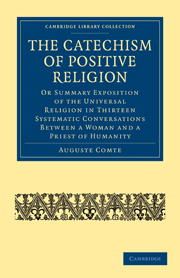 The Catechism of Positive Religion
The Catechism of Positive Religion Book contents
- Frontmatter
- PREFATORY NOTE TO THIRD EDITTON
- Contents
- PREFACE
- POSITIVIST LIBRARY
- HINT TO THE READER
- INTRODUCTION
- First Part EXPLANATION OF THE WORSHIP
- Second Part EXPLANATION OF THE DOCTRINE
- Third Part EXPLANATION OF THE REGIME, OR SYSTEM OF LIFE
- CONVERSATION IX The Regime as a whole
- CONVERSATION X Private Life
- CONVERSATION XI Public life
- CONCLUSION: GENERAL HISTORY OF RELIGION
- TABLES
CONVERSATION X - Private Life
Published online by Cambridge University Press: 05 October 2010
- Frontmatter
- PREFATORY NOTE TO THIRD EDITTON
- Contents
- PREFACE
- POSITIVIST LIBRARY
- HINT TO THE READER
- INTRODUCTION
- First Part EXPLANATION OF THE WORSHIP
- Second Part EXPLANATION OF THE DOCTRINE
- Third Part EXPLANATION OF THE REGIME, OR SYSTEM OF LIFE
- CONVERSATION IX The Regime as a whole
- CONVERSATION X Private Life
- CONVERSATION XI Public life
- CONCLUSION: GENERAL HISTORY OF RELIGION
- TABLES
Summary
The Woman.—At the close of the foregoing conversation, I did not ask you, my father, what would be the proper subject of each of the two other conferences on the life. I quite felt that the two halves of the practical domain of our religion must have essentially the same subdivisions, always taken from the existence which they are respectively to idealise and guide. The study of the worship, then, indicated the plan which suits that of the regime, first private, then public life. In that which is our subject to-day, I also feel that you are going to distinguish similarly the individual existence and the family life.
The Priest.—For the first, which becomes the normal basis of all human conduct, its regeneration by Positivism consists, my daughter, in placing it on a social footing. This radical transformation, at all times denied to theologism, monotheistic more than any, but constantly anticipated and demanded more and more loudly by the public instinct, is not now the product of any sentimental exaggeration. It rests solely on an accurate appreciation of the real facts, which in the human order, more synthetical than any other, looks to the whole before the parts.
Although every human function is necessarily discharged by an individual organ, its true nature is always social; since the share of the individual agent in it is always subordinate to the indivisible contribution of contemporaries and predecessors.
- Type
- Chapter
- Information
- The Catechism of Positive ReligionOr Summary Exposition of the Universal Religion in Thirteen Systematic Conversations between a Woman and a Priest of Humanity, pp. 212 - 229Publisher: Cambridge University PressPrint publication year: 2009First published in: 1891


